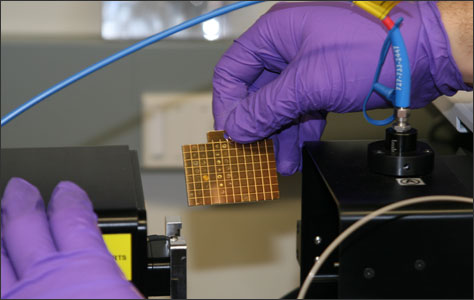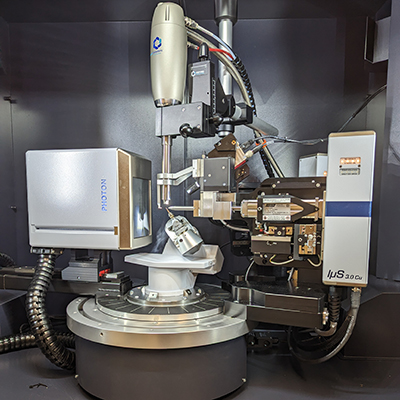Facilities & Instrumentation
Research Facilities and Shared Instrumentation
The Chemistry Department is located in the Merkert Chemistry Center, a 109,000 square foot structure designed to empower the dynamic, cutting-edge research for which the department is internationally recognized. The Merkert Chemistry Center contains faculty research laboratories in organic chemistry, chemical biology, and physical chemistry; specialized research facilities and shared instrumentation; and classrooms and teaching laboratories. Chemistry faculty members have collaborated on the unique design of their own research laboratories, which are built to accommodate state-of-the-art instrumentation and adapt to new research directions. The Merkert Chemistry Center was built in 1991 through the generosity of Mr. Eugene F. Merkert, a successful Boston businessman.
Among the superb research resources that the Merkert Chemistry Center provides to our faculty and students are three specialized research facilities, each with its own shared, state-of-the-art instrumentation and professional scientific director. The facilities located in the Merkert Chemistry Center are part of the University's Core Facilities. More information about these resources can be found by visiting the Vice Provost for Research website.

Mass Spectrometry Center
The Mass Spectrometry Center is a full service facility, providing high resolution mass spectral data from electrospray, APCI, APPI, MALDI-TOF, and DART.
Magnetic Resonance Center
The MRC maintains a 600, 400, and three 500 MHz NMR spectrometers, as well as two EPR systems: one EMX-Plus and one ESR-5000. The two federally funded 500 MHz Bruker systems are equipped with autosamplers and cryoprobes (one helium and one Prodigy).

X-ray Crystallography Center
The X-ray Crystallography Center is fully equipped with several diffractometers, including an area detector instrument, constant temperature rooms for crystal growth, and several VAX and Silicon Graphics computers for investigation of protein and small molecule structure.
Scientific Data Management System
Scientific data from the department's three research facilities is now being archived automatically to a remote repository on campus using the Waters NuGenesis® Scientific Data Management System (SDMS). Printed and file formatted data is being saved with searchable “metadata” attached, including the operator’s Faculty Advisor, BC username, Sample Name, Laboratory Notebook, and Page Number. The SDMS solution includes Waters NuGenesis Vision® and NuGenesis UNIFY® software that together provide an application independent data aggregation tool to capture and store data to a central repository in one common format. Information in the repository is text searchable, vector scalable, and fully reusable by all researchers and faculty for data analysis and management.

